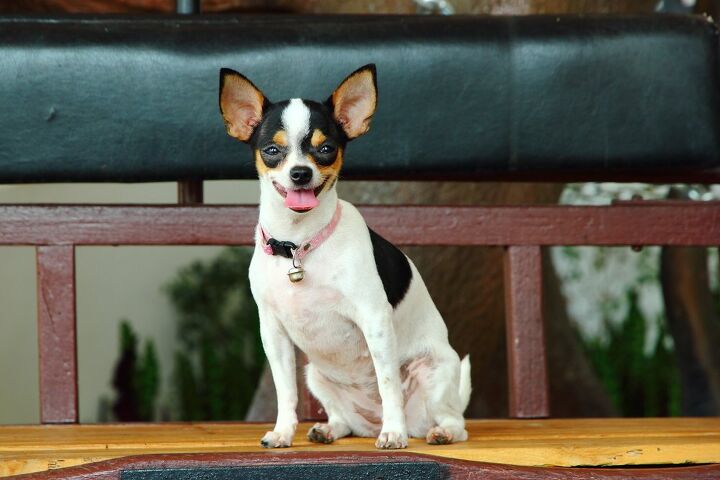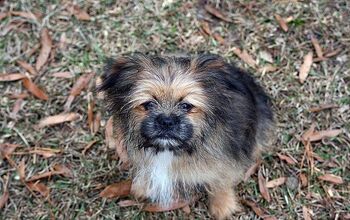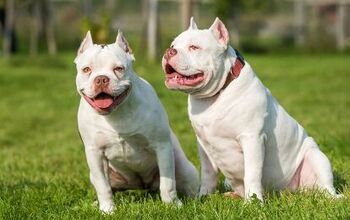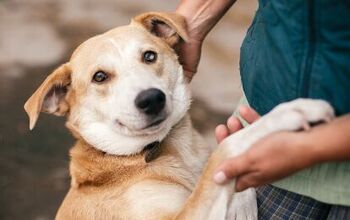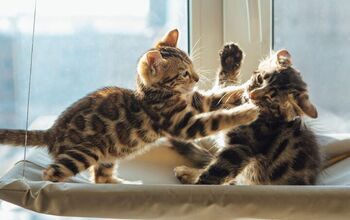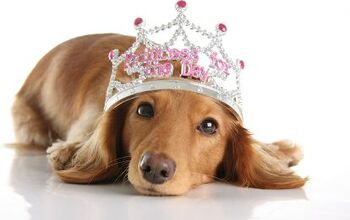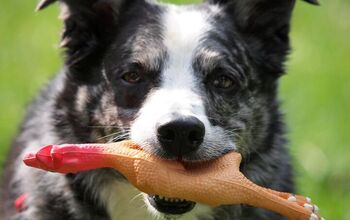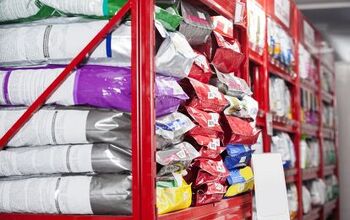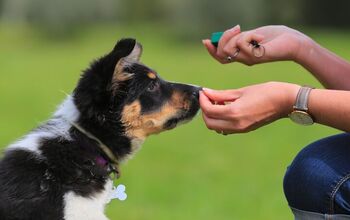Pomerat


About Pomerat
A spunky, spirited little dog with a heart too big for its small body- that’s the Pomerat for you. These designer dogs are best known for their cute looks and lively personality that makes them great companions, especially for singles or families with older children. Also known as the Pomerat Terrier, this hybrid dog was developed by crossing the feisty Pomeranian and the playful Rat Terrier. This unusual cross resulted in a designer breed that’s gaining more and more popularity every day, both for its adorable appearance and great temperament.
Provided that they’ve been trained and socialized, Pomerat dogs will be ideal companions. Their sweet and loving nature will make them true cuddle bugs- after they’ve spent all that energy, they’ll love nothing more than to curl up with you on the sofa for an ear scratching, belly rubbing marathon. However, this tendency to bond deeply with their owners often leaves them susceptible to separation anxiety. Ideally, a Pomerat owner would be someone who’d work from home or a family in which someone is always around. If you work long hours, it’s highly likely that this designer dog will become destructive and depressed, so choosing a more independent dog breed would be a better option for you.
Goofy, friendly, and full of love, this energetic dog is a perfect fit for families with older children and active people.
It’s impossible to pinpoint the location and time when the Pomerat breed was first created. As this is a fairly new designer dog breed, there is not much history to it and it’s not easy to determine when the crossbreeding of Rat Terrier and the Pomeranian became intentional. However, it’s highly likely that the origin of the Pomerat doesn’t differ much than that of most designer dog breeds. This means that these hybrid dogs were probably first created in the last two decades, somewhere in the United State.
Of course, while the history of the Pomerat is short and it’s origin story unknown, the same can’t be said for its parents. The Pomeranian is a breed in good standing ever since the 18th century when it was first bred to be a companion for nobles and royalty. The Rat Terrier, as the breed’s name implies, was originally used to hunt rats, but has since evolved to be a cherished family pet.
The Pomerat is not recognized as an official breed, not by the American Kennel Club or any other major canine organization. This means that Pomerat puppies don’t have regular pedigree papers you’d expect with purebred puppies. On the other hand, clubs that recognize designer breeds sometimes give out their version of pedigree or a certificate to mixed breed dogs, but it’s not a guarantee of the puppy’s good ancestry.
The best way to get information about your new pet’s family tree is to inquire about their parents’ pedigree. A responsible, reputable breeder will have a pedigree for their purebred parents and will be more than happy to provide it. However, if the breeder seems unwilling to share information about the puppy’s parents or has none, it’s probable that you’re dealing with a backyard breeder. You should never get a pet from puppy mills or dubious breeding situations, as it’s not only inhumane but increases the chance of your pet being sick or born with congenital defects.
To make sure your new puppy grows up to be a healthy adult dog, you’ll need to provide them with a well-balanced, nutritionally-rich diet throughout their lifetime. For a Pomerat, this usually means choosing a high-quality dry food mix for small breed dogs. These dogs tend to be more active than your average small-sized pooch, but it doesn’t mean you should give them more food make up for it. Choosing a premium-quality kibble will meet all their needs, including the energetic value of the food, so there’s no need to up the recommended portions. To make sure you’re not overfeeding your pet, consult the feeding guide for the brand you’re giving them, and serve their food in one or two meals. Leaving out food for them to nibble on whenever they want is never a good idea.
Additionally, you can mix things up with an occasional homecooked meal or wet food. Treats are a great reward, too, especially if you use them during training sessions as a motivation. Just make sure you’re not going overboard as these petite canines can gain weight quickly, which leads to health problems.
Pomerat is more active than your average small breed dog, and will need high-quality food to meet its nutritive and caloric needs.
The Pomerat needs a firm hand and an owner that will assert himself as a leader of the pack. It’s not that these hybrid dogs are unruly if left unchecked, but they can be a bit mischievous and strong-willed if you let them. Additionally, both the Pomeranian and the Rat Terrier breed are well-known as stubborn and smart dogs that can be a bit difficult to train. Their intelligence enables them to learn things fast, but you’ll have to know how to motivate them to sit through a training session if you want to teach them anything.
Fortunately, the positive reinforcement method, coupled with a bit of patience, can work wonders for the energetic Pomerat. Once you discover how to best manage your new spunky puppy, you’ll have no problem teaching them their manners. To boot, as they’re quite smart and active, these designer dogs can also be trained to compete in agility.
Both the Pomeranian and the Rat Terrier belong to the category of small breeds, so there are no major differences between them in terms of size. Their offspring will be of small stature, as well. Adult Pomerat can weigh between 5 to 25 pounds on average. The closeness to either end of the scale will depend on the puppy’s sex and the parent whose genes were more dominant.
If you like small dogs with a big personality, you will love the Pomerat. It’s hard not to be smitten by these petite charmers, in all honesty. Owing to its Pom parent, this designer dog will be devoted and alert, often acting more as a watchdog than a lap dog. They can spend their afternoons “stalking” passersby from the window sill, yapping if they deem a stranger potentially intruding on their territory.
The Pomerat is friendly and energetic, and, more often than not, extremely playful. They’ll love to visit the dog park, play with toys and get into trouble if allowed. However, even though this makes them seem like a great pet for children, they’re not. Their fragile build makes them easy to hurt, and young children often like to pick up small dogs, ending in injury. Additionally, Pomerat can be a bit snappy if they think that someone is pushing their buttons, so a small child might be bitten in play.
They are also very loving and sweet and will love to cuddle and spend time with their owners. In fact, they might love it a bit too much- as they are prone to separation anxiety because of their attachment to people. If possible, a Pomerat will love to spend every waking moment around his peeps, but if socialized on time, he won’t see it as the end of the world when you have to leave for work.
One of the many reasons why people start breeding designer dogs in the first place was to produce pooches that have fewer health issues than their purebred parents. In some cases, that didn’t end up being true. Sometimes, instead of improving the odds of a puppy being born healthy, you introduce a whole new set of issues from the other parent’s breed. This can cause designer dogs to be susceptible to two sets of breed-specific health problems instead of (n)one. However, in the case of the Pomerat, the opposite is true. These hybrid dogs are remarkably healthy and tend to be affected by far fewer issues than any of their parents.
There are, of course, some genetic-related concerns, but they are minor compared to most other breeds. These include patellar luxation (kneecap dislocation), hip dysplasia, and entropion (folded eyelid). As for other Pomerat-specific issues, tooth loss is a potential concern. All small breed dogs are susceptible to plaque buildup if oral hygiene is not up to par, so make sure to brush those tiny teeth regularly. Dental treats can also be a good choice for maintaining gum and teeth health.
All things considered, the Pomerat probably hasn’t been around long enough for its lifespan to be determined. After all, they’ve only been popular as a breed in the last few years! However, based on what we know about small breeds in general, as well as the Pomeranian and Rat Terrier specifically, we can guesstimate this hybrid dog’s life expectancy with a great accuracy. Provided that its needs are met and good care provided, these petite pooches can live to be 15 to 18 years, without any serious health issues.
As the offspring of two spirited small dog breeds, the Pomerat is quite energetic compared to other petite pooches. However, even when you consider that they’re a furry ball of endless energy, it’s still much easier to keep them exercised than it would be if they were a large breed.
On average, anywhere between 30 to 45 minutes of daily activity will keep these perky puppers exercised and happy. Daily walks are a must, and it’s strongly encouraged to spend as much time as possible playing with your Pomerat. A game of fetch in the dog park, or some zoomies in the fenced backyard will benefit them immensely. Additionally, due to their impressive smarts, these pooches need to be stimulated mentally, as well. Get them a few puzzle toys to keep them entertained for hours on end!
As Pomerat is very smart, you’ll need to keep their mind exercised, too, and not just their tiny bodies.
While the American Kennel Club might not recognize hybrid dogs as official breeds, there are many canine clubs and organizations that do. The world of designer dogs is expanding rapidly and these non-official groups are doing their best to keep up with the many hybrids and ensure that the breeding practices are up to standards. The clubs that recognize the Pomerat or Pomerat Terrier, as it is also known, include American Canine Hybrid Club, Designer Dogs Kennel Club, Dog Registry of America, and International Designer Canine Registry.
When it comes to their hair, Rat Terrier and the Pomeranian are on the opposite sides of the spectrum. The fluffy Pom has a mono-colored, long, furry coat and the terrier parent boasts a short, low-maintenance hair that’s often marked by two-colored patches. What does this all mean for their offspring?
The Pomerat can favor one or the other parent more, which will strongly influence their appearance. Their hair can be short, long or anything in between, but they’re known to be low-maintenance in terms of grooming. Few weekly brushing sessions and an occasional bath will keep your Pomerat looking spick and span.
As for the colors of their coat, they can be either black or tan all over, or sport two-colored coat, brown-white, and tan-black being the most common combinations of shades.
Pomerat puppies will melt your heart. Those fox-like faces, tiny size, and big hearts leave no one indifferent! Once you get your puppy home, you’ll need to make sure to get through basic training and socialization with them. Potty training and leash training will probably be the first things you focus on, but make sure to take time to teach them to be independent. Coupled with crate training, this can help you avoid separation anxiety issues.
With proper upbringing, your Pomerat pet will be a wonderful companion. Goofy, friendly, and full of love, this energetic dog is a perfect fit for families with older or no children, as well as active people who enjoy adventuring with their pet.
Photo credit: Annette Shaff/Shutterstock; boyphare/Shutterstock; mary981/Shutterstock

A proud mama to seven dogs and ten cats, Angela spends her days writing for her fellow pet parents and pampering her furballs, all of whom are rescues. When she's not gushing over her adorable cats or playing with her dogs, she can be found curled up with a good fantasy book.
More by Angela Vuckovic



